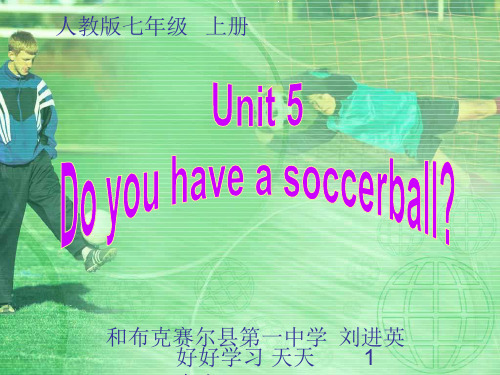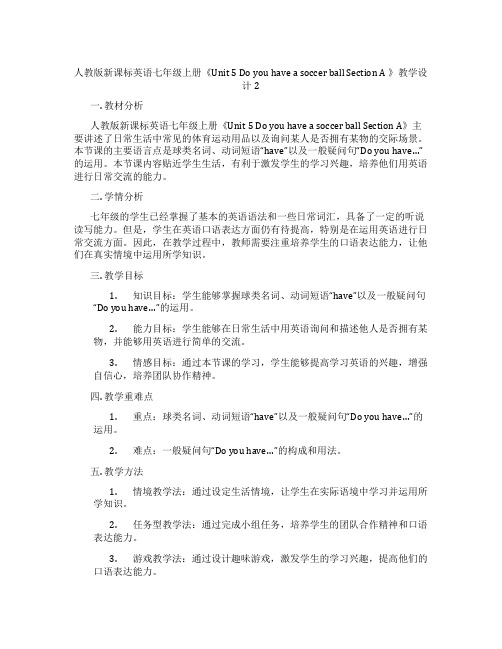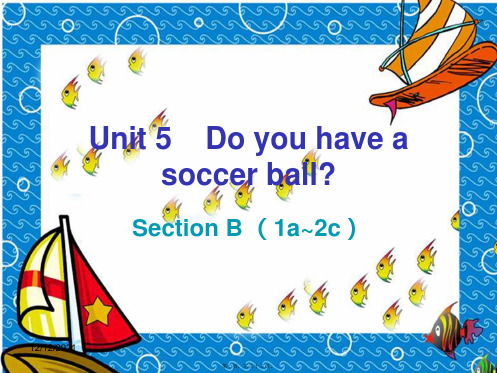湖南省蓝山县第一中学七年级英语上册 Unit 5 Do you have a soccer ball
人教版(PEP义务教育版)初一英语七年级上册人教版 Unit 5 Do you have a so

2、Lucy has a baseball .
好好学习 天天向上
10
根据汉语提示完成句子。
1. 你有一只棒球拍吗?
_D__o__ you __h_a_v_e_ a baseball __b_a_t_?
Does he /she have a …?
1、Yes, he/she does. He/She has a ... . /
2、No, he/she doesn't. He/She doesn't have a ... .
好好学习 天天 8
Make complete sentences
连词成句
好好学习 天天 9
4. volleyball _e_ 5D. obaysokuethbaavlel _ad_…?
I don't have a ping-pong ball.
I have a ping-pong bat.
6. baYseesb,aIldl o. I have a ... . / batN_ob_, I don't. I don't have a ... . 好好学习 天天 7
Game rules 游戏规则
每个小组领4组单词条(含标点符号),小组
合作,将单词条和标点符号根据谁有什么。和谁有 什么吗?句式,用完所给的单词和标点符号组成句
子。组句完全正确且用时短者为获胜小组。
For example例如: 单词条(含标点符号):1、you a do ball have ping-pang ?
I _h_a_v_e_ a _b_a_s_k__e_tb__a_ll_ and a ping pong _b_a_t_.
人教版新课标英语七年级上册《Unit 5 Do you have a soccer ball Sec

人教版新课标英语七年级上册《Unit 5 Do you have a soccer ball Section A 》教学设计2一. 教材分析人教版新课标英语七年级上册《Unit 5 Do you have a soccer ball Section A》主要讲述了日常生活中常见的体育运动用品以及询问某人是否拥有某物的交际场景。
本节课的主要语言点是球类名词、动词短语“have”以及一般疑问句“Do you have…”的运用。
本节课内容贴近学生生活,有利于激发学生的学习兴趣,培养他们用英语进行日常交流的能力。
二. 学情分析七年级的学生已经掌握了基本的英语语法和一些日常词汇,具备了一定的听说读写能力。
但是,学生在英语口语表达方面仍有待提高,特别是在运用英语进行日常交流方面。
因此,在教学过程中,教师需要注重培养学生的口语表达能力,让他们在真实情境中运用所学知识。
三. 教学目标1.知识目标:学生能够掌握球类名词、动词短语“have”以及一般疑问句“Do you have…”的运用。
2.能力目标:学生能够在日常生活中用英语询问和描述他人是否拥有某物,并能够用英语进行简单的交流。
3.情感目标:通过本节课的学习,学生能够提高学习英语的兴趣,增强自信心,培养团队协作精神。
四. 教学重难点1.重点:球类名词、动词短语“have”以及一般疑问句“Do you have…”的运用。
2.难点:一般疑问句“Do you have…”的构成和用法。
五. 教学方法1.情境教学法:通过设定生活情境,让学生在实际语境中学习并运用所学知识。
2.任务型教学法:通过完成小组任务,培养学生的团队合作精神和口语表达能力。
3.游戏教学法:通过设计趣味游戏,激发学生的学习兴趣,提高他们的口语表达能力。
六. 教学准备1.教师准备:提前准备好教学课件、球类图片、实物球类等教学资源。
2.学生准备:预习本节课内容,了解球类名词和动词短语“have”的用法。
七年级英语上册unit5doyouhaveasoccerballsectionb1a2c

12/12/2021
第五页,共二十三页。
【应用(yìngyòng)】根据句意及首字母提示完成单词
1. It's f__u_n___ to play computer games. 2. We have f__u_n___ at the party. 【2】watch的用法 【教材例句】OK, let's watch TV. 好吧,咱们看电视吧。 (教材第28页1b and 1c听力材料) 【要点思维导图】
【应用】
( A )1. —Let's ______ the volleyball game on TV. —That sounds good.
A. watch
B. look at
C. see
( )2. Boys and girls, please ____ the blackboard.
A. Blook
A. and B. or
C. to
D. with
( D )2. I like to play sports ______ Grace. It's relaxing.
A. to
B. at
C. of
D. with
12/12/2021
第十页,共二十三页。
易混词 (组) 辨析 句型“It's+adj.(+for sb.)+to do sth.”的用法
Unit 5 Do you have a soccer ball?
Section B (1a~2c)
12/12/2021
第一页,共二十三页。
课前导 学 (qiándǎo)
七年级英语上册《Unit-5-Do-you-have-a-soccer-ball》讲学稿2

Do you have a soccer ball学习目标与要求:1.学习球类名词词汇并能熟练描述物品所属关系的对话,能熟练谈论物品所属。
2. 熟练运用句型:Do/Does +主语+have...? 肯定回答:Yes,主语+do/does. 否定回答:No,主语+don’t/doesn’t.第一段:【短课导学】模块一:自主学习你有棒球吗?1___________________________ A.plays B.to play C.play D.playing第二段:【长课导学】模块二:交流研讨模块三:巩固内化课题Unit5 Do you have a soccer ball?授课时间:第11周班级姓名模块四:当堂训练(独立完成)老师的话:复杂的事情简单做,简单的事情认真做,认真做的事情重复做,重复做的事情创造性做!一时专一事,最好的自己,你一定成功!一、根据所给首字母或汉语提示完成单词。
1.She likes ____________(体育运动)very much.2.____________(让我们) play tennis.3.Sue has two ____________ (篮球).4.My mother ____________(看) TV every day.5.My mother ____________(有) a nice book.6.These are nice girls.We all like t__________.二.单选题.()1.I ________ TV at night(在晚上).A.look at B.see C.watch D.look()2.Let’s ________ the map on the wall.A.look at B.see C.watch D.look()3.I can ________ many things on the table.A.look atB.see C.watch D.look()4.T he question is not easy. It’s very ________.A.difficult B.difficulty C.relating D.not difficult()5.Let’s play ________ basketball. I don’t like playing ________ violin(小提琴)at home.A.the, the B.the, ×C.×, the D.×, ×()6.________ your friend like English?A.Does B.Do C.IsD.Has( )7.Let’s ________ and ________ football on the playground.A.to go, to play B.go, play C.to go, play D.go, to play三.补全对话。
七年级上册英语第五单元

七年级上册英语第五单元以下是人教版七年级上册英语第五单元的内容,供您参考:
Unit 5 Do you have a soccer ball?
Section A
1. 词汇:
have
soccer
ball
let
us
play
with
them
can
I
we
your
friend
she
he
her
his
2. 常用表达:
Do you have a soccer ball? 你有一个足球吗?
I don’t have a soccer ball. 我没有足球。
Let’s play soccer. 让我们踢足球吧。
3. 语法:一般现在时(第三人称单数形式)的基本用法。
4. 课文内容:通过对话形式介绍朋友之间互相询问拥有物品的情况,并邀请对方一起玩。
5. 练习:完成课本上的练习题,包括词汇、语法和阅读理解等。
Section B
1. 词汇:增加一些与运动相关的词汇,如basketball、ping-pong、volleyball等。
2. 常用表达:增加一些与运动相关的表达,如“I like playing basketball.”、“Do you want to play ping-pong?”等。
3. 语法:介绍更多的情态动词,如“can”、“may”、“must”等的基本用法。
4. 课文内容:通过对话形式介绍各种运动,并询问对方是否喜欢某项运动。
5. 练习:完成课本上的练习题,包括词汇、语法和阅读理解等。
6. 听力和口语练习:听力和口语练习,以提高英语交际能力。
七年级英语上册 Unit 5 Do you have a soccer ball(第4课时)Sect

Unit 5 Do you have a soccer ball? Section B(2a-self check)Learning Goals:In this lesson, the students will learn to use have\has to talk about the ownership. The teacher should remind the Ss of using have\has during reading Do you have a Soccer Ball? By reading, the Ss can learn how to describe what things they have. Lead the Ss to talk about their sports collection.Teaching and learning steps:Step I.Pre-reading activities1. PreviewAsk the Ss to translate the following Chinese into English. First ask the Ss to put them into English orally, then let them write English down without looking at the textbooks.(1)我有的东西 _______________________(2)我没有的东西 ________________________(3)谁有足球? _________________________(4)你有足球吗? _____________________(5)我没有足球,但是我弟弟艾伦有。
______________(6) 我们上同一所学校,都喜欢足球。
_________________(7)我们和朋友们在学校踢足球。
- 1、下载文档前请自行甄别文档内容的完整性,平台不提供额外的编辑、内容补充、找答案等附加服务。
- 2、"仅部分预览"的文档,不可在线预览部分如存在完整性等问题,可反馈申请退款(可完整预览的文档不适用该条件!)。
- 3、如文档侵犯您的权益,请联系客服反馈,我们会尽快为您处理(人工客服工作时间:9:00-18:30)。
T:What about baseball?
S1:No, I don’t. I don’t like it .
T:OK.Let’s play volleyball after class.
教法
学法
直观教学法、模仿示范法、情境教学和合作学习法。
教学过程
Step 1Warming-up and revision
1. Present the structure of last lesson.(show a volleyball to a student)
T:Let’s make a conversation about your sport you like. Do you like volleyball?
Unit 5 Do you have a soccer ball?
教材
简析
Section B在Section A的基础上进行话题内容拓展,活动1a是听前活动,让学生先学习描述性形容词interesting,fun,relaxing,boring,difficult..活动1b-1c让学生继续巩固have﹙has﹚的使用,表达物品所属关系。1d重点训练两个重点句型Let’s…和That sounds
Ss:interesting, fun, relaxing, boring, difficult.
2.Explain tቤተ መጻሕፍቲ ባይዱe Chinese meaning of them.
3.Then match each picture with one of the words.
4.(Point to the five pictures and ask students to match them.)
Section B,1a. Point to the five words and ask students to repeat each one. Then point to the five pictures and ask students to match each picture with one of the words. Have them write the letter of the picture on the line next to each word. Then correct the answer.s
…以及描述性形容词的运用。活动2a-2c的内容是一个整体,2a巩固词汇,2b-2c是阅读理解活动。3a-3c是整个单元的语言输出练习,是对单元目标语言的运用。
预设
目标
1、知识目标:1.New words: intresting,boring,fun,difficult,relaxing,watch TV
教学
重难点
-- Let’s play soccer.
--I don’t have a soccer.
---Well, let’s play volleyball.
---That sounds goo
教具 准备
A tape recorder, some balls
知识
链接
Baseball 的文化知识和基本的比赛规则
5.Correct the answers
Step 3Presentation
T: Do you like playing computer games? Ss: Yes, I do. I think it’s fun. T: Do you like watching TV? S: Yes, I do. It’s relaxing. . T: Do you like playing ping-pong ball? S: Yes, I do. It is very interesting. T: Do you like watching movies? S: No, I don’t. It’s boring. T: Do you like math? S: Yes, I do. T: But I don’t like it. It’s boring. Then write these words one by one.
2.—Let’s play computer games. –That sounds interesting
2、语言技能目标:能够使用描述性形容词来描述体育活动
3、情感目标︰A.在本单元中,通过阅读有关运动的文章和对话
使学生更加热爱体育活动并培养一种适合自己的体育爱好;
B.在小组活动中,培养学生团结协作精神
(Point to the blanks where the students write their answers.)
S1:Great.
2. Work in pairs and make a similar conversation
Step 2 New words
1.Read the words in1a.(Point to the five words in1aand ask students to repeat each one.)
4.Check the answers.
Step 5 Listening (1c)
Practice in recognizing specific vocabulary words in conversation and in writing them.First, listen to the recording in 1b. What does Paul say about the activities?
Step 4 Listening (1b, ,)
1.One student read the five words in1aabove to the class.
2.Students only listen.(Play the recording the first time.)
3.Listen again and check the words you hear in1a.(Play the recording again.)
